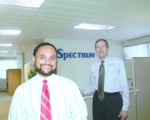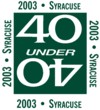 |
| Spectrum Solutions does a little of everything | |
| by Fran LeFort, Journal Staff | |
 | |
| 01/23/04: Spectrum Software Solutions 6562 Ridings Rd. Syracuse, NY 13206 Phone: (315) 457-7700 Fax: (315) 457-5125 Online: www.specusa.com Square Footage: 6,000 Employees: 35 Year Founded: 1997 Annual Revenues: Slightly more than $2 million • Major players? Frank Kunnumpurath, owner and president; Tom Flynn, vice president of information-technology sales; Dr. Ancy Kunnumpurath, director of medical-transcription services. • What does the company do? It provides information-technology (IT) and medical-transcription services. On the IT side, the company provides on-site human resources for software-application development. When on-site assistance is cost prohibitive and the job can be done remotely, the company also provides software services from experts in a business in India, which is owned by Kunnumpurath’s other family members. It also matches up clients to professionals from around the world with hard-to-find skill sets. Any of the jobs can be long- or short-term projects. “We have the infrastructure that is almost a worldwide reach and can bring them to New York. Most recruiters are limited to people in the local area,” Frank Kunnumpurath says. The company diversified into medical-transcription services in 1999. It can either provide this service from the Central New York area or contract from outside the country for about 30 percent less. • What are some examples of work you’ve done for clients? Kunnumpurath identified a person in Singapore about three years ago who had almost the exact skills Welch Allyn needed. About five years ago, when Carrier Corp. was implementing an ERP (Enterprise Resource Planning) application product, it could not find experienced people, and Kunnumpurath was able to identify and provide experienced individuals. It has also provided staffing for niche skills to BlueCross BlueShield. • What’s an example of offshore work? In Cortland, BMC (Buckbee-Mears) needed some modification to its custom database and called on Spectrum Software. “They could not find resources within their budget, and we were able to help them from our India office,” Kunnumpurath says. • What are the differences between doing a job on-site and from an offshore location? “With off-shore you’re talking a fraction of the cost, less than 10 percent of what big companies charge to do it on-site,” Kunnumpurath says. “As a buyer, you decide where the work will be done … And there are things we can never get done from India. Understanding customers and communication can be difficult from India. But, on the other hand, once that information-gathering is over here and then the second part is executed from our India office, it’s all science.” • Cost of services? Offshore services range anywhere from $15 an hour to $30 an hour. On-site services range from $30 to as much as $80 an hour. • How do the medical-transcription services operate? Traditionally, doctors have dictated patient information on a tape. The tapes are either in-house or taken to other places where the worker would transcribe the information onto paper or a floppy disk. Spectrum Software has created a system using digital, voice-recording devices already available in the marketplace, which eliminates tapes and allows transcriptionists to work virtually from anywhere in the world, whether it’s their homes, on the beach in Florida, or in another country. • How did this diversification help your bottom line? “We were able to compensate some decline in our consulting, because of a drop in the IT business, and continue to grow the revenues by 20 percent,” Kunnumpurath says. • Which makes up the bulk of your business? Revenues are slightly more than $2 million, with medical transcription now comprising more than 65 percent. IT on-site staffing is about 25 percent and off-site application development is about 10 percent. • What is your background? Kunnumpurath, a certified public accountant, was a financial analyst with several Wall Street firms for four years and left because the work wasn’t satisfying. He has always had an interest in technology, minoring in it in college, and saw starting Spectrum Software as a way to run a business that helps clients. “I have a general interest in business,” he says. “I wanted to see how the value is created. As an accountant, somebody would look at the profit and see if it was calculated accurately. I was always beyond that. I would look at how they made that money, how they were able to buy such and such, and create such as such and sell it for that price.” • Are there patents? No. • How does the company get clients? Word of mouth and clients finding the business via the Internet. • Where are clients from? Medical transcription: 15 percent from Central New York. On-site staffing: 60 to 70 percent from Central New York. Software development: 20 percent from Central New York. The rest are spread across the nation. • Where does the funding come from? All was borrowed from friends because banks wouldn’t lend him money in the beginning. Kunnumpurath says he was turned down for a loan because he didn’t have any collateral and didn’t have any relevant business experience. • What are some of the obstacles you’ve overcome? Lack of funding in the beginning and marketing. • Where will the company be one year from now? Kunnumpurath expects revenues to reach more than $3 million. • Five years from now? Spectrum Software will continue its transcription and software-development businesses and will diversify into other, ancillary services such as medical coding, radiology, and maintaining large Web sites for companies, leading to substantial revenue increases, to at least $10 million. • Advice to small-business owners: “You have to have a passion for what you are going to do,” he says. “If you don’t, it can become miserable for you because business takes a lot from you. I work a lot more hours than in my employment years. But I also have freedom.” Fran LeFort is a freelance writer living in Auburn. |
|
|
| |
  | |
|
| |
